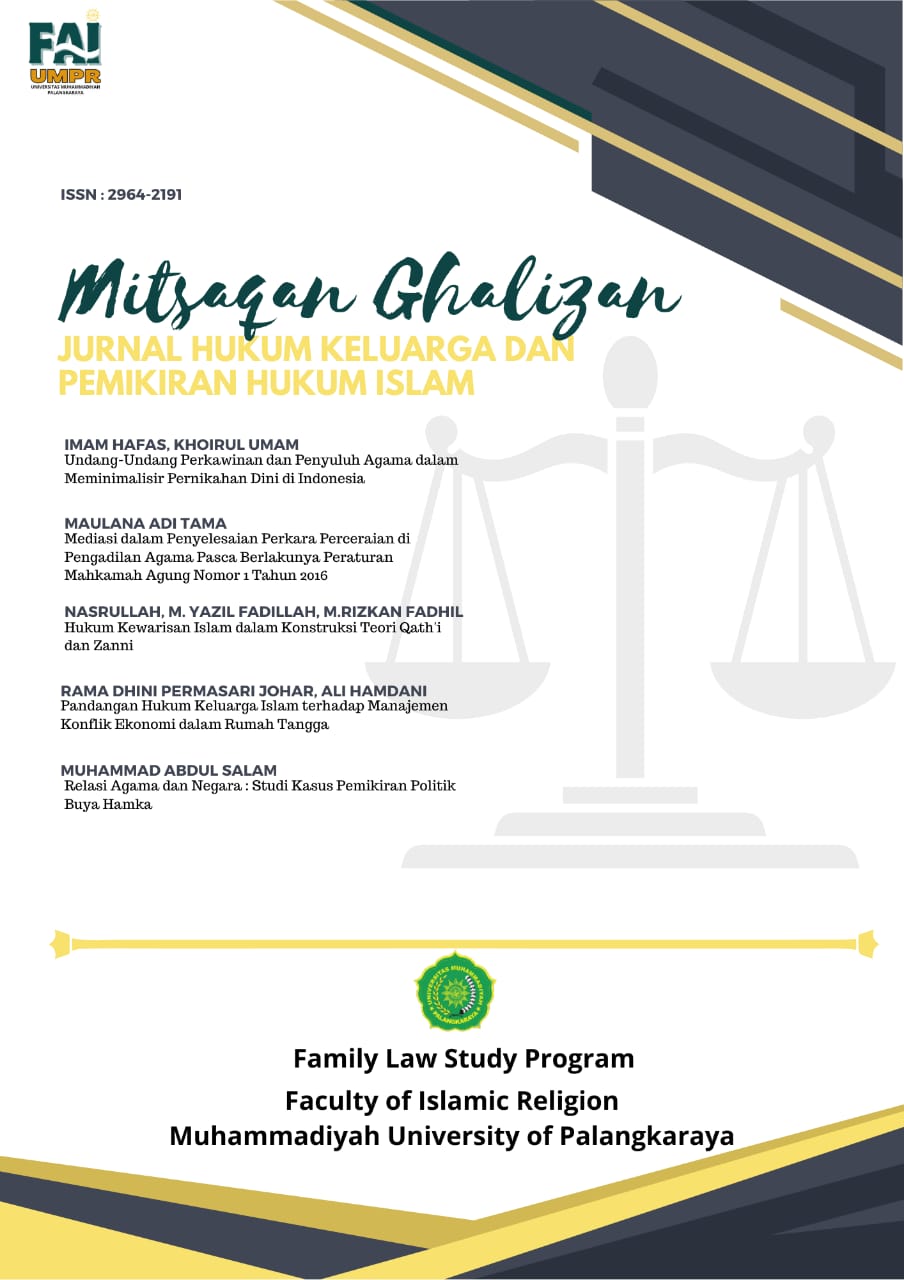Pandangan Hukum Keluarga Islam terhadap Manajemen Konflik Ekonomi Dalam Rumah Tangga Views of Islamic Family Law on Economic Conflict Management in the Household
Main Article Content
Abstract
This paper discusses about Islamic Family Law View on Economic Conflict Management in the Household. This research is motivated by the findings of many previous research results regarding the high divorce rate, the main cause of which is due to economic problems in the household. It is important to study how Islamic Family Law provides solutionsto economic problems that occur between husband and wife so that divorce can be avoided. His research is included in the type of library research (library research). To process the data that the author has obtained. So the authors analysis using content analysis techniques (content analysis). The results of this research is incuded in the type of library research. To process the data that the authors analyza using content analysis techniques. The result of this study reveal that the solutions for resolving economic conflict in the household in the view of islamic Famiy Law include: the husband fulfills the rights of his wife, the wife must know when she has the right to earn a living from her husband, the wife must know when she has the right to earn a livingfrom her husband, the wife must not demand rights beyond the limits of the husband’s ability, the wife must be patient and sincere with her husband.
Downloads
Article Details

This work is licensed under a Creative Commons Attribution-ShareAlike 4.0 International License.
References
Abdurrahman, 1992, Kompilasi Hukum Islam di Indonesia, Jakarta: Akademika Presindo.
Bahri Syamsul, 2015, konsep nafkah dalam hukum islam, Kanun jurnal ilmu hukum Agustus.
Dayuk Eko Prasetyo 2020 analisis penyebab ekonomi sebagai faktor perceraian di pengadilan agama pati tahun 2018 Universias Islam Agung Semarang
Harjianto, Raudhotul Jannah, identifikasi penyebab faktor perceraian sebagai dasar konsep pendidikan pra nikah di Kabupaten Banyuwangi, Jurnal Ilmiah Universitas Batanghari Jambi Vol.19 No1 Februari 2019
Ibnu Rusyd, Bidayatul Mujtahid,
Irawan Prasetyo, 2006, Penelitian Kualitatif dan Kuantitatif, Jakarta: DIA FISIP UI.
al-Jaziri Abdurrahman, 1969, Kitab Al Fiqh Ala Mazdzahabi Al Arba’ah, Beirut: Dar Alkutub Al ‘Ilmiah,
Nurul Fadhlilah, faktor-faktor penyebab perceraian(studi terhadap perceraian
di Desa Batur kecamatan Getasan Kabupaten Semarang) Jurusan Syari’ah Program Studi Ahwal al-Syakhshiyah. 2013
Mohd Ghazali, Norzulaili, 2007, Nusyuz, Syiqaq dan Hakam menurut al-Qur’an, Sunnah, dan Undang-Undang Keluarga Islam, Kuala Lumpur: Universitas Islam Malaysia.
Muchtar, Kamal, 1974, Asas-Asas Hukum Islam, Jakarta: PT. Karya Unipress.
Mujieb M. Abdul dkk, 1994, Kamus Istilah Fiqih, Jakarta: Pustaka Firdaus.
Nuruddin Amir dan Azhari Akmal Tarigan, 2004, Hukum Perdata Islam di Indonesia, Jakarta: Prenada Media.
Saebani Beni Ahmad, 2001, Fikih Munakahat 2, Bandung: Pustaka Setia.
Soekanto Soerjono, et al, 2009, Penelitian Hukum Normatif Suatu Tinjauan Singkat, Jakarta: PT. Raja Grafindo Persada.
Syarifuddin Amir, 2006, Hukum Perkawinan di Indonesia: antara Fikih Munakahat dan Undang-Undang Perkawinan, Jakarta: Kencana.
Urip Tri Wijayanti, jurnal ilmu keluarga dan konsumen volume 14 no 1 tahun 2021
